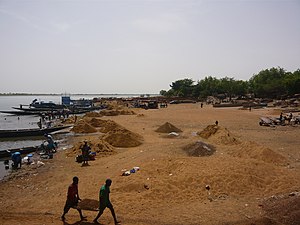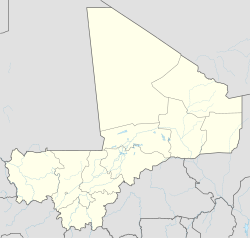Ségou
| Ségou | |
|---|---|
| Commune and town | |

Ségou workers
|
|
| Location within Mali | |
| Coordinates: 13°27′N 6°16′W / 13.450°N 6.267°WCoordinates: 13°27′N 6°16′W / 13.450°N 6.267°W | |
| Country |
|
| Region | Ségou |
| Cercle | Ségou Cercle |
| Area | |
| • Total | 37 km2 (14 sq mi) |
| Elevation | 294 m (965 ft) |
| Population (2009 census) | |
| • Total | 130,690 |
| • Density | 3,500/km2 (9,100/sq mi) |
| Time zone | GMT (UTC+0) |
Ségou (also Segou, Segu, Seku) is a town and an urban commune in south-central Mali that lies 235 kilometres (146 mi) northeast of Bamako on the River Niger. The town is the capital of the Ségou Cercle and the Ségou Region. With 130,690 inhabitants in 2009, it is the fifth-largest town in Mali.
The village of Ségou-Koro, 10 km upstream of the present town, was established in the 17th century and became the capital of the Bambara Empire.
In the middle of the 19th century there were four villages with the name of Ségou spread out over a distance of around 12 km along the right bank of the river. They were, starting from the most upstream, Ségou-Koro (Old Ségou), Ségou-Bougou, Ségou-Koura (New Ségou) and Ségou-Sikoro. The present town is on the site of Ségou-Sikoro.
The village of Ségou-Koro prospered after Biton Mamary Coulibaly became king in 1712 and founded the Ségou (or Bamana) Empire. Mungo Park became the first European known to have visited the village in 1796. The empire gradually declined and was conquered by El Hadj Umar Tall's Toucouleur Empire in 1861, then by the French Army Colonel Louis Archinard in 1890.
Ségou has contested origins. Some claim that the word Ségou come from "Sikoro", meaning to the foot of a shea butter tree. Others argue that it was named after Cheikou, a marabout who founded the city, while still other theories support the claim that Ségou was founded by the Bozo fishermen coming from the north, who established their villages along the Niger River.
The 11th century CE saw an influx of the Soninke people, who were trying to escape from the expansion of the Ghana Empire, with Mandinka populations following. It is believed that Kaladjan Koulibaly, founder of the Bambara Kingdom's Koulibaly dynasty established the first sedentary villages here at his time. The later Diarra dynasty moved the capital of the Bambara Kingdom to Ségou.
...
Wikipedia

